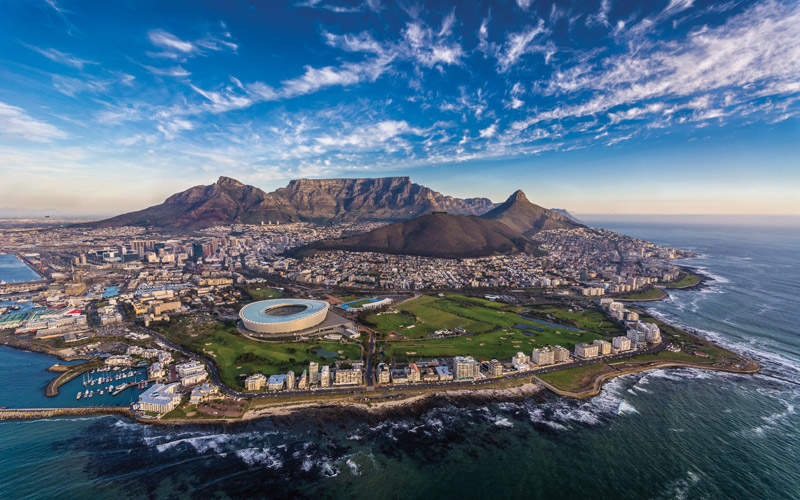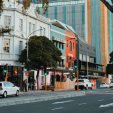The diamond showroom where you can polish your own stone
Interview with Hot Water’s lead singer Donovan Copley
On everything from the meaning of life to the band’s eclectic music
Bring some water to the boil, add elements of traditional South African sound, mix in a bit of folk, blues and indie-pop rock, stir well...and, there you have it – the recipe for the up and coming South African band Hot Water.
Or as lead singer, and Bob Dylan doppelganger Donovan Copley more aptly explains, “Hot Water’s music and its members come from a spread of mixed backgrounds because South Africa itself is represented by so many different identities.”
For those who have yet to jam to the Cape Town-based artists’ music, the band incorporates elements of kwela, mbaqanga, sakkie-sakkie, ghoema, maskandi and kwasa kwasa, and Donovan often sings in Xhosa. Quite an achievement, even though Donovan says ‘it doesn’t matter about the language, the rhythm talks it away.’
Regardless though, we sat down with Donovan to talk shop, the city and the long and short of Hot Water.
First get a great taste of Hot Water and their music with these video's:
Hot Water 'warming up' The Hague Jazz 2009 Hot Water - laduma [live]
CapeTownMag: Where does the name Hot Water comes from?
DC: I think when you choose a name for a band you want to find something that holds the energy and the vibe of what it’s about. So, I think Hot Water is like a neutral substance - a substance that can mean trouble, or a substance that can bring positive, vital aspects to life.
I think it started out very open and become more and more specific, if that makes sense. So the name is just a space to explore basically. When you think about a pot with hot water you can do a lot with what that is.
CapeTownMag: How did you come up such a mixed sound?
DC: It [the selection of the genre] starts with the very personal process of going, ‘what is my identity’? I am English, mixed European. My family has been in South Africa for generations, and I was born in the Eastern Cape. So, I am kind of African, but obviously I am not African. That, in a way, is what the music reflects; it is how you bring together the English and the Afrikaans and the African.
So where do I land? I kind of land in the middle, and that is where I’ve always been. I am the middle child; I was born in the middle of the year. So for me, it is very much about making a bridge that connects all the different aspects.
CapeTownMag: Is there an area of Cape Town that has influenced your music?
DC: Ten years ago there was a huge fire in Cape Town, including the Chapman’s Peak side close to where I live. A lot of areas in Cape Town were burning; it was like the end of the world. At that instant, I went down to the beach and it was just getting dark. The fire was literally coming down the mountain. Pieces of trees were rolling down and bouncing into the sea, and it felt like the fire and the water were coming to dance together – just like the name of the band.
It’s not where I got it from, but I was feeling the name. That experience had a big impact, and I wrote a song called ‘Bushfire’ on our first album, which was our first single. I also wrote a song called ‘Shu Shu’ on our second album, which was also very much linked to that experience of that fire.
CapeTownMag: Where is your best place to grab a beer with friends on a Friday night?
DC: I can tell you the best place to grab a chicken sandwich in town after a rehearsal. In Albert Road in Woodstock down the way across from our rehearsal studio is a café. I don’t know the name of the place, but you get a chicken meal sandwich for, like, 14 rand - it’s amazing. There’s, like, an Indian Mama that makes it; it’s just perfect, with a little bit cheese, salt and pepper, very good!
CapeTownMag: If anything were possible, where would be the best place in Cape Town to have a concert?
DC: I want to do a concert on Robben Island. Hot Water is about transformation on the emotional and psychological level, much like Robben Island.....and it has a great view of Table Mountain!
CapeTownMag: What goals do you have going forward in life?
DC: A goal for me is to fulfil the calling that I have. I think any sort of organism’s natural feeling is it wants to become what it is. For me it’s about fulfilling that feeling.
CapeTownMag: What song of yours are you most connected to, and why?
DC: I think because I am from the Eastern Cape, I feel most connected to a song called ‘Siki Siki.’ It’s a place on top of the Eastern Cape - Siki Siki. Also, ‘siki siki’ - the sound is just great; and just the story that song tells. It’s a universal story, a story that I feel.
CapeTownMag: What’s the funniest thing that happened at a gig or on the road?
DC:It was in Amsterdam actually. We played a show in the middle of Amsterdam, the middle of the red-light district. We had driven in earlier in the afternoon and unloaded our stuff, but you can’t drive in later. So we had to carry our stuff afterwards to where the car was parked, and the quickest way to get there was straight through the middle of the red-light district. So all together, the whole band and the manager, we walked through the red light district. That was pretty funny. You got your guitars and your instruments and your walking through the red-light district,
CapeTownMag: Is there a place in which you still want to perform and why?
DC: Central Park in Manhattan, New York. America is the centre of the world isn’t it? (Sarcastic laugh) And that’s the middle of the middle you know? Yeah, Central Park would be an amazing place to play. There have been some iconic concerts there.
CapeTownMag: What artists/bands do you admire?
DC: I love music from the 60s and 70s: Bob Dylan, Jimi Hendrix, Bob Marley, Paul Simon. And then you’ve got the South African Johnny Clegg, Juluka and a lot of artists from the sixties that were tapped in.
CapeTownMag: What is your favourite song ever?
DC: I think it’s ‘Graceland’ or ‘Diamonds on the Soles of her Shoes’ by Paul Simon. That album [Graceland] really opened the doorway to the world for South African Music, the South African sound.
CapeTownMag: When you’re not making music, what do you do in your spare time?
DC: People often ask me that. I am in the music business. So, when I am not doing music, I am doing business. I think in a way there is an imbalance between the music and business side of things. It’s maybe too much about the business and not enough about the music. Music and Business. Those two things need to marry. So when I am not busy with music, I am busy with business.
A question from CapeTownMag reader Rachel Botsis: Uyakwazi ukuthetha isiXhosa kakuhle? [Translation: Do you speak Xhosa fluently?]
DC: Haikhona, Ndithetha isiXhosa kancinci nje! [Translation: Nope, I only speak a little Xhosa!]
Donovan added to this: I am not singing a whole section in Xhosa; I am building a bridge with words. The guys I am working with enhance that.
By Karin Willemsen for the CapeTownMagazine.com Cape Town Music Series. The Cape Town music Series is a project of CapeTownMagazine.com highlighting muscians, bands and DJs based in Cape Town and the Western Cape.
For new interviews subscribe to our weekly newsletter. Stay tuned for more about South African music and musician**s** from Cape Town on our Facebook page and on Twitter








